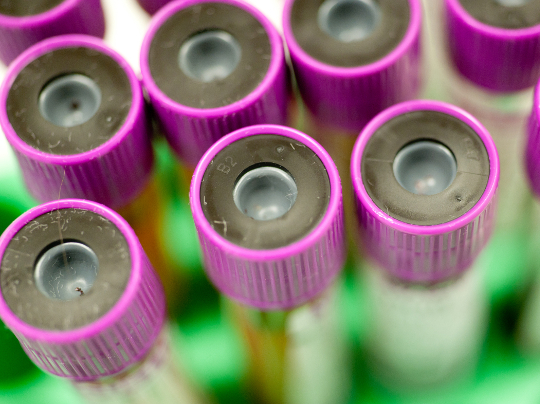Scientists have developed a new test to identify patients who are at risk of suffering a relapse from testicular cancer.
Assessing just three features of a common kind of testicular cancer – called non-seminomatous germ cell tumour – can identify those at most at risk of relapse even where there is no evidence of tumour spread.
The researchers believe the test could be used in the clinic to make decisions about which patients should be given chemotherapy.
Scientists at The Institute of Cancer Research, London, analysed 177 tumour samples from patients with stage I non-seminomatous tumours enrolled in clinical trials through the Medical Research Council (MRC) Clinical Trials Unit.
The work was funded by the MRC with support from the National Cancer Research Institute Testis Cancer Clinical Studies Group, and is published in Clinical Cancer Research.
Scientists at the ICR found that three different features of the tumours were important indicators of relapse risk: the levels of a molecule called CXCL12, the percentage of the tumour with an appearance of cancer stem cells and whether or not blood vessels were present in the tumour.
They scored tumours based on these features, and found that combining scores could divide patients up into three different risk groups based on how likely patients were to suffer a relapse of the disease within two years. It is rare for a patient to relapse from testicular cancer beyond this time.
They found that the vast majority of patients were in the low-risk group – where 94.3% of patients were relapse-free for two years. In the moderate-risk group 65.9% of patients were relapse free. Strikingly, only 30% of patients were relapse free in the high-risk group.
The researchers were able to validate the test in an additional group of 80 patients at The Royal Marsden NHS Foundation Trust.
Testicular germ cell tumours are the most common solid malignant tumour in young Caucasian men. Patients diagnosed with early-stage disease face a choice between monitoring with treatment if relapse does occur or upfront chemotherapy with its associated long-term side-effects. Predicting who does or does not need chemotherapy up front is therefore important to minimise treatment in this largely curable disease.
Study leader Professor Janet Shipley, Professor of Cancer Molecular Pathology at the ICR, said: “Our research has led to the development of a test that can detect patients that will benefit from treatment up front and spare those who are at lower risk from the side-effects of chemotherapy.
“Chemotherapy is extremely effective in treating testicular cancer, but it can have long-term consequences for a patient’s health and wellbeing. Patients deemed at low risk of relapse could simply be monitored and potentially could avoid chemotherapy. Approaches such as this to minimise chemotherapy are particularly important for cancers like testicular cancer, which affect young adults who could live with the side-effects for decades.”
Professor Robert Huddart, Professor of Urological Cancer at the ICR, and Consultant at The Royal Marsden, said: “Patients with stage I non-seminomatous germ cell tumours have to make a difficult choice of whether to be watched or to receive chemotherapy to reduce the risk of relapse. Our study may help men make this decision as among the three groups of patients identified we have found one with a very low risk of relapse where surveillance would seem to be best choice and a small group of men who have a very high risk of relapse who could be targeted with chemotherapy. We now need to test this prognostic index in larger groups of men in the clinic.”
